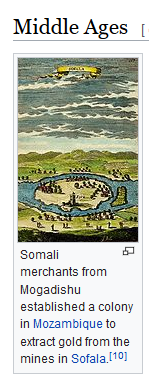Wiki is all screwed up. There were no mines in Sofala. The gold came from the Great Zimbabwe gold fields. Wiki conflates Somali and Shirazi. The Somali clans don't even form until the 12th-13th centuries. The Fakhrudin Mosque is 13th century. The first mention of the Somali ethnicity is 15th century. The Ajuraan come to power in the middle of the 16th and never rule from Mog. The Shirazis settle the Banadir in the 10th-11th centuries and move south from there to form the Swahili culture. In 956 Ali bin Selimani the Persian becomes first Sultan of Kilwa, which Sultanate seizes control of Sofala and the Great Zimbabwe gold fields in 1180.
https://www.britishmuseum.org/pdf/SwahiliCoast_StudentsWorksheets.pdf
" Then came Sultan Ali bin Selimani the Persian. He came with his ships, and brought his goods and his children. One child was called Fatima. We do not know the names of the other children. They disembarked at Kilwa, that is to say, they went to the headman of the country, the Elder Mrimba, and asked for a place in which to trade goods and beads. Sultan Ali married Mrimba’s daughter. He lived on good terms with the people. Freeman-Grenville 1962: 221"
https://www.revolvy.com/topic/Shirazi people&item_type=topic
"There are two main theories about the origins of the Shirazi people. One thesis based on
oral tradition states that immigrants from the
Shirazregion in southwestern
Iran directly settled various mainland ports and islands on the eastern Africa seaboard beginning in the tenth century, in an area between
Mogadishu,
Somalia in the north and
Sofala in the south.[9][10] According to Irving Kaplan, prior to the 7th century, the coastal areas frequented by the
Persian migrants were inhabited by non-
NegroidAfricans. By the time of the Persian settlement in the area, these earlier occupants had been displaced by incoming
Bantu and
Niloticpopulations.[11] More people from different parts of the
Persian Gulf also continued to migrate to the
Swahili coast over several centuries thereafter, and these formed the modern Shirazi.[12]
The second theory on Shirazi origins posits that they came from Persia, but first settled on the Somalia littoral near Mogadishu.[9] In the twelfth century, as the gold trade with the distant entrepot of
Sofala on the Mozambique seaboard grew, the settlers are then said to moved southwards to various coastal towns in Kenya,
Tanzania, northern Mozambique and the Indian Ocean islands. By 1200 AD, they had established local sultanates and mercantile networks on the islands of
Kilwa,
Mafia and
Comoros along the Swahili coast, and in northwestern
Madagascar.[13][3][14][15][16]
Some academics have questioned the authenticity of the primarily Persian origin claim.[17][18] They point to the relative rarity of Persian customs and speech, lack of documentary evidence of Shia Islam in the Muslim literature on the Swahili Coast, and instead a historic abundance of Sunni Arab-related evidence.[19] These academics state that the evidence confirms mass migration to the African coast over the centuries from the Persian Gulf and Arabia, but
Persian Gulf is much more than a Persian coast.[19] There are also several different versions of stories about the settlement of Shirazi along the Swahili Coast.[20] According to Ari Nave and Irving Kaplan, the Shirazi ethnic group is likely the result of "a combined African, Arab and Persian" elements.[2][11] Jack Drake indicates that through these intermarriages between Persian and
Arab male settlers and local Bantu women, the offspring learned Persian and Arab terms related to culture, navigation merchandise, war, artisanal tools, products and travel, as well as Bantu agricultural and daily vocabulary.[21]"
This is history. There is nothing anti-Somali about it.



 huh.
huh.







